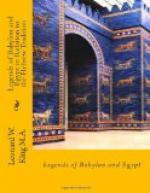(4) The hundred and twenty “sars”, or 432,000 years assigned by Berossus for the duration of the Antediluvian dynasty, are distributed as follows among the ten kings; the numbers are given below first in “sars”, followed by their equivalents in years within brackets: 1. Ten “sars” (36,000); 2. Three (10,800); 3. Thirteen (46,800); 4. Twelve (43,200); 5. Eighteen (64,800); 6. Ten (36,000); 7. Eighteen (64,800); 8. Ten (36,000); 9. Eight (28,800); 10. Eighteen (64,800).
For comparison with Berossus it may be useful to abstract from the Sumerian Dynastic List the royal names occurring in the earliest extant dynasties. They are given below with variant forms from duplicate copies of the list, and against each is added the number of years its owner is recorded to have ruled. The figures giving the total duration of each dynasty, either in the summaries or under the separate reigns, are sometimes not completely preserved; in such cases an x is added to the total of the figures still legible. Except in those cases referred to in the foot-notes, all the names are written in the Sumerian lists without the determinative for “god”.
KINGDOM
OF KISH
(23 kings; 18,000 + x years, 3 months,
3 days)
. . .(1) 8. (. . .) 900(?) years 9. Galumum, Kalumum 900 " 10. Zugagib, Zugakib 830 " 11. Arpi, Arpiu, Arbum 720 " 12. Etana(2) 635 (or 625) years 13. Pili . . .(3) 410 years 14. Enmenunna, Enmennunna(4) 611 " 15. Melamkish 900 " 16. Barsalnunna 1,200 " 17. Mesza(. . .) (. . .) " . . .(5) 22. . . . 900 years 23. . . . 625 "
KINGDOM OF
EANNA (ERECH)(6)
(About 10-12 kings; 2,171 +
x years)
1. Meskingasher
325 years
2. Enmerkar
420 "
3. Lugalbanda(7) 1,200
"
4. Dumuzi(8) (i.e. Tammuz)
100 "
5. Gishbilgames(9) (i.e. Gilgamesh)
126 (or 186) years
6. (. . .)lugal (. . .)
years
. . .(10)
KINGDOM
OF UR
(4 kings; 171 years)
1. Mesannipada 80 years 2. Meskiagnunna 30 " 3. Elu(. . .) 25 " 4. Balu(. . .) 36 "
KINGDOM
OF AWAN
(3 kings; 356 years)
. . .(11)
(1) Gap of seven, or possibly eight, names.
(2) The name Etana is
written in the lists with and without
the determinative for
“god”.
(3) The reading of the
last sign in the name is unknown. A
variant form of the
name possibly begins with Bali.
(4) This form is given
on a fragment of a late Assyrian copy
of the list; cf. Studies
in Eastern History, Vol. III, p.
143.




